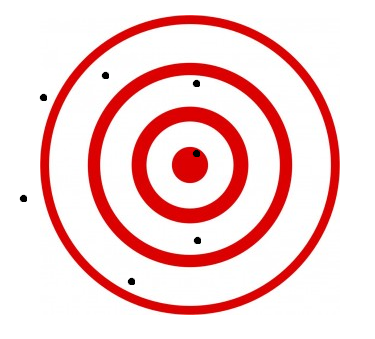define mass
the amount of matter in an object
Define volume.
Volume is the amount of space an object takes up.
Define density.
Density is the amount of matter in a given volume.
What is an intrinsic property?
An intrinsic property is a property of matter that is not dependent on size. Examples are density, melting point, boiling point, hardness, and luster

Accurate- NO
Precise- Yes
What is the tool and unit for measuring mass?
The tool is a triple beam/electronic balance and the unit is grams.
What is the unit and tool used to find volume?
To find the volume of a liquid, the tool is a graduated cylinder and the unit is mL.
To find the volume of an irregular solid, the tool is a graduated cylinder (displacement) and the unit is cm3 because it is a solid.
To find the volume of a regular solid, you use the formula Length x Width X Height.
What is the density of an object with a volume of 100 cm3 and a mass of 20 grams?
CAREFUL!! The density is mass/volume, so it is 20/100 or 0.2 g/cm3.
What is an extrinsic property?
An extrinsic property is a property of matter that does depend on its size. Examples are mass, volume, weight and length.

Accurate - Yes
Precise - No
How do I find the mass of a liquid?
One way is to find the mass of the empty cylinder, add liquid and mass again, then find the difference.
Another way is to measure the cylinder on an electric balance, tare it, then add the liquid.
I have a graduated cylinder with 80 mL of water in it. I drop in a rock and the liquid goes up to 124 mL. What is the volume of the rock? Include the unit.
The volume of the rock is 44 cm3. 124-80 = 44 and it is a solid, so the unit is cm3.
Honey - 1.42 g/mL; olive oil-0.90 g/mL;
water-1.0g/mL; Ethyl alcohol - 0.81 g/mL
are poured into a beaker. List the order starting with the one on the top down to the one on the bottom.
ethyl alcohol, olive oil, water, and honey would be at the bottom, because it is the densest.
What is the mass of water?
This is not answerable. Since mass is an extrinsic property, dependent on size, it depends on how much you have. There is no answer.

Accurate- Yes
Precise - Yes
If I go to the moon, will my mass change? What about my weight? Why?
My mass will not change. I will still be made of the same matter. My weight will change b/c the force of gravity changes.
What is the volume of a cube with a side measuring 3.2 cm. Use a calculator.
The volume is 3.2 X 3.2 X 3.2 which = 32.77 cm3
It is not 3.2 x 3!!!!
You find a substance and break it into two pieces. The two pieces of the samples are labeled Sample A and Sample B. Sample A is twice as big as Sample B. Is Sample A's density bigger than Sample B's density? Why or Why not?
What is the volume of water?
Again, cannot be answered. Volume is dependent on size, or extrinsic. Volume depends on how much of it you have.

Accurate- NO
Precise- NO
I have a sample of a substance with a mass of 500 grams. I cut the substance in half, each half has a mass of ...
Explain
Each half has a mass of 250 grams. Mass is an extrinsic property, which means it is dependent on the size of the sample. 1/2 of 500 = 250!
I have a sample of a substance with a volume of 50 cm3. I cut the substance in half, each half has a volume of ...
Explain
Each half has a volume of 25 cm3. Volume is an extrinsic property, which means the size of the sample changes the measurement.
Do you know what the sample is?
First, find the volume of the regular solid using:
l x w x h, so 10 x 5 x 2 = 100 cm3 then, m/v
1,930/100 = 19.3 g/cm3...It's GOLD!!!
What is the density of water?
The density of water is 1 g/mL. Since density is intrinsic, I can assign a number to it because the size of the sample doesn't matter.
What is awesome?
You! :)